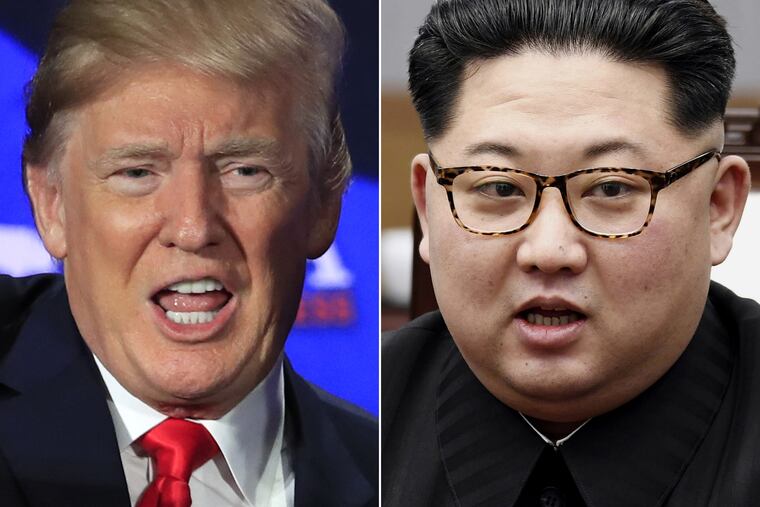U.S.-North Korea relations: Donald Trump, Kim Jong Un to have summit in Singapore
The path toward the Singapore summit between North Korea and the United States has been volatile and fraught with hostility.

President Trump and North Korean leader Kim Jong Un will be meeting in Singapore, marking the first time a sitting U.S. president has met with a North Korean leader.
Here's what you need to know about the summit, and how we got here.
The summit
When: The summit will happen Tuesday at 9 a.m. local time in Singapore, which is 9 p.m. Monday in Philadelphia.
Where: The meeting will be at the Capella Hotel. According to Time, Singapore was carefully chosen for its safety, prosperity and neutrality. The Capella Hotel is a secluded, luxury, Singaporean-owned establishment.
Who: Trump and Kim will initially meet alone, along with their translators, USA Today reported. There will also be a second meeting in which U.S. Secretary of State Mike Pompeo, White House Chief of Staff John Kelly, National Security Adviser John Bolton and others will be present.
What will be discussed: The focus of the meeting is expected to be North Korea's denuclearization and reduction of its weapons arsenal.
How long the summit will last: Although the exact length of the summit is unclear, President Trump is expected to leave Singapore on Tuesday at about 8 p.m. local time (8 a.m. Tuesday East Coast time).
Inquirer and Daily News columnist Trudy Rubin writes that Trump will have to be wary of North Korean demands to remove U.S. troops from the Korean peninsula, and that he should not underestimate Kim's strong negotiation skills.
>> READ MORE: Trump-Kim summit: What to watch for when they meet in Singapore | Trudy Rubin
According to Kelsey Davenport, the director for nonproliferation policy at the Arms Control Association, a non-partisan group that works to educate the public about effective arms control, this meeting is not likely to yield significant results, but will probably serve as a stepping-stone toward future acts of diplomacy.
The summit is unprecedented largely due to the two countries' volatile history, and the path toward negotiations has been fraught with hostility.
A brief history of U.S. and North Korean relations
The tense relations between the United States and North Korea date back to the Korean War, which took the lives of about 3 million Koreans and 58,000 U.S. soldiers between 1950 and 1953.
Hostilities were ended by a truce and technically a state of war still exists between the opposing parties.
After the fighting stopped, the 1960s and 70s were marked by "rapid industrial growth" for North Korea, according to BBC. In 1985, North Korea further involved itself in global politics, joining the international Nuclear Non-Proliferation Treaty.
The 1990s saw internal instability for North Korea. In 1994, with the country in the midst of a severe famine, leader Kim Il Sung passed away, and his oldest son, Kim Jong Il, took power.
Despite this, there were attempts to diplomatically settle differences between the United States and North Korea. The countries signed framework that required North Korea to freeze its nuclear-weapons program in exchange for two nuclear power reactors from the United States.
But in 2002, it was revealed that North Korea had been secretly developing a nuclear program. Subsequently, Pyongyang announced that it would be pulling out of the Nuclear Non-Proliferation Treaty, along with an agreement to keep nuclear weapons off of the Korean Peninsula.
North Korea spent much of the 2000s enriching uranium and developing nuclear weapons, which were tested twice. After a third test in 2013, the United Nations imposed sanctions. Over the next three years, both the United Nations and the United States imposed increasingly tight sanctions in response to North Korea's growing nuclear program.
Donald Trump and Kim Jong Un: a war of words
After Trump took office in January 2017, tensions began to bubble. Last July, North Korea conducted its first successful test of an intercontinental ballistic missile capable of reaching Alaska and claimed to have successfully tested a hydrogen bomb.
Along with increasing hostility, these tests prompted Trump to state that he would not hesitate to "totally destroy" North Korea if the United States or an ally were attacked. Kim responded by calling Trump "mentally deranged."
The tide turns
The war of words was short-lived in part due to the 2018 Winter Olympics in Pyeongchang, South Korea. South Korean President Moon Jae-in invited North Korean athletes to march alongside athletes from his own country in the opening ceremony. Kim Yo Jong, Kim Jong Un's sister, attended the Games.
Both Trump and Kim indicated a desire to meet to discuss denuclearization after the Olympics. Mike Pompeo, who was then the CIA director and is now secretary of state, took a secret trip to meet with Kim in April, and North Korea said it would suspend nuclear testing.
On again, off again
After Kim committed to a moratorium on testing, he and Trump settled on a date to meet. But on May 24, the meeting was canceled amid hostility over comments made by one of Trump's advisers that compared North Korea to Libya.
>> READ MORE: North Korea meeting canceled thanks to Trump team's bluster | Trudy Rubin
Then, on June 1, Trump announced that the summit was back on, and both leaders began preparing for the monumental meeting.
As of Monday morning, both leaders were in Singapore and the summit was slated to commence as scheduled.